Let’s look at the new artificial intelligence race that has taken the world by storm – ChatGPT vs Google Bard. Which of these dialogue applications will work the best? How reliable is artificial intelligence in its current state?
This article will explore these big tech language models, how they work, and what they can do. So far, it seems ChatGPT is more reliable for creative tasks. Google Bard AI will focus more on logical, complex answers.
Although Google’s Bard has not yet launched, there are some clues about what we can expect.
AI Models ChatGPT vs Google’s Bard – What’s the Difference?
The most obvious difference is that the one only covers data used to train it, while the other can access the web.
ChatGPT uses pre-trained machine learning. ChatGPT does not reflect events or developments from November 30, 2021, onwards.
Google’s Bard language model is LaMDA. It is a web-based language model. It will have up-to-date information as it browses the internet for answers.
Both these chatbots aim to simplify complex information.
The user can get an idea of the concept and then delve deeper into the subject.
OpenAI’s ChatGPT
ChatGPT stands for Chat Generative Pre-Trained Transformer. This chatbot learned to respond through supervised and reinforcement learning techniques.
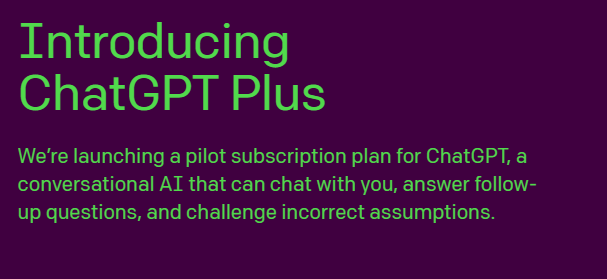
Backed by Microsoft, there is a sign-up subscription where users can use the AI chatbot for free. A paid-for subscription is available only here in the US so far. It’s called ChatGPT Plus and costs $20 per month. This option gives priority to paying subscriptions with access and speed.
Open AI’s ChatGPT will integrate into Microsoft’s Search Engine, called “The New Bing.” It is not yet available, but you can join their waiting list and see examples of what it can do.
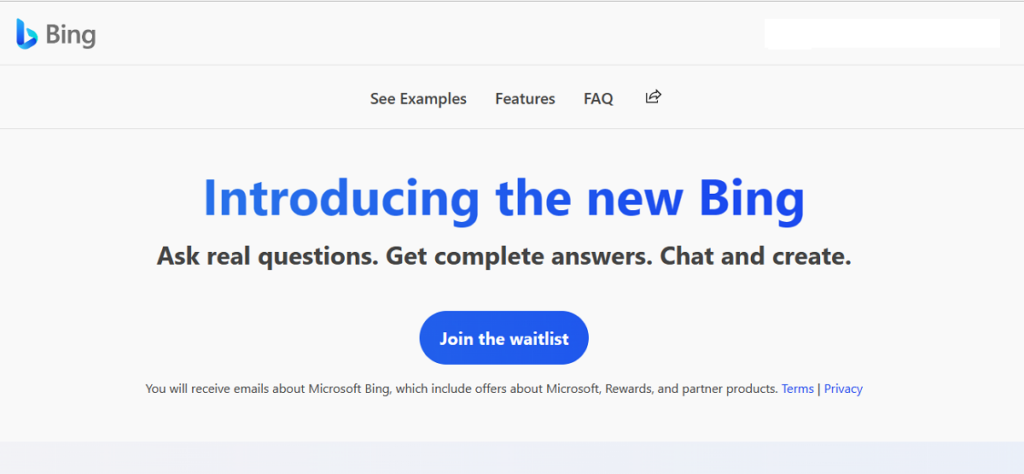
It will also integrate into Microsoft Lens and Microsoft Teams Premium. This subscription will increase to $10 per month.
ChatGPT is a text-based artificial intelligence. It can create text – some say as good as, if not better than, the average person would be able to do. It is capable of understanding and answering a wide range of questions.
But when ChatGPT can’t find an answer, it could make one up!
What Open AI’s Chatbot Can Do For You
ChatGPT will suit your needs if you want a simple, concise answer. You’ll skip wading through pages of search results with OpenAI’s tool. The only problem is you cannot always rely on the answers.
What this clever AI-powered chatbot can do for you is:
- Education: Write complex essays (with guidance) and research topics (up to November 2021).
- Employment: Design a professional CV or write a resignation letter.
- Manufacturing: Provide information on how to create a production schedule or create a business efficiency outline.
- Real Estate: Write professional and convincing home listings for real estate agents. And calculate mortgage payments.
- Business Administration: Draft letters, agreements, sales emails, and contracts.
- Translate an essay from English to French and at least another 12 languages.
- IT: Simple code writing, such as JavaScript and Python. It can assist with debugging code and coding for simple websites (with guidance) and also write technical documentation.
- Marketing: Write articles and documentation. Provide suggestions for marketing strategies.
- Social Media: Create high-quality, unique writing. This could be captions, blogs (but you most likely won’t want to use ChatGPT on your blog, for an AI writing assistant, you’ll want Jasper), and social media posts targeted to a specific audience.
- Small Business and Start-Ups: Provide information on start-up ideas and creating business plans.
Although it can do all these things, it’s important to remember to fact-check all information given by ChatGPT.
You might also be interested in finding out if ChatGPT will replace human writers and how to make money with ChatGPT.
Meet Google’s Bard, the ChatGPT Rival Chatbot
The definition of “Bard” fits what this dialogue application promises to do. The name derives from Celtic culture. A Bard was a professional storyteller, composer, oral historian, and verse maker – sponsored by a patron.
Google’s Bard AI promises to do all these things with conversational AI and more! Bard AI sources information from the web. This ChatGPT rival will also provide human-like, high-quality responses.
Unfortunately, the only way to test this AI chatBot is to be a “Beta Tester.” Google is no longer accepting applications for Beta Testers. We will have to wait and see until Google Bard’s official launch to test what it can do.
Google’s Bard and LaMDA Conversation Technology
Google’s new AI model called Bard uses LaMDA, a language model for dialogue applications, to learn from the web by scanning for related words, phrases, and ideas.
Bard integrates into the Google Search Engine, offering a summary of information and links to related pages. According to Google’s AI updates page, Bard aims to combine knowledge with LaMDA’s intelligence, and it can answer any question, including current events, by utilizing the internet.
With access to the web, this tech company could overcome the current limitations of ChatGPT.

Language is complicated. On the “LaMDA, our breakthrough conversation technology,” blog Google describes that it has always focused on language. What makes us human is the use of subtleties and nuances. At the same time, it makes the development of chatbots and artificial intelligence a grueling task.
This AI learning machine aims to notice the nuances and subtleties of language. It picks up on language differences, for example, sensibleness. LaMDA differs from other language models because LaMDA is trained on dialogue.
Bard is free to “Trusted Testers” and unavailable to the public. Yet, Google announced that some AI features are already integrated into Google Maps. Google promises its AI chatbot will be available to users within the coming weeks.
ChatGPT and the Google Search Engine
Without Bard, Google is a Search Engine, and that is all.
Google has the added benefit of the associated Google applications. These add much value to its functions in daily life. Google aims to incorporate these apps into Google Bard.
The OpenAI ChatGPT model uses natural language processing and is not a search engine.
Yet, the “New Bing” search engine will mean users no longer have to use the traditional search bar – we will have to wait and see how this will work. It will integrate into Opera and Microsoft Edge. When asked a question, the answer will be simple, concise, and easy to understand. It will summarise information.
When creating text, music, or coding, ChatGPT’s responses can be dazzling, with an eerie human touch. It makes finding information very easy.
ChatGPT’s shortcomings might motivate Google’s Bard to aim for better accuracy and credibility.
Three Test Questions for Chat GPT
ChatGPT is upfront about what it can do, its limitations, and its capabilities. This information shows on its front page before you start any dialogue with the chatbot.
We decided to put ChatGPT to the test with three random questions.
Our first question to ChatGPT was: “Write a business plan for a new company that sells automated bakery equipment.”
ChatGPT provided us with a company name, BakeBot. It was simple but very apt for the business idea.
The business plan was well written. There was some accurate information and creative ideas on how to make this business work. There were also many assumptions and inaccuracies.
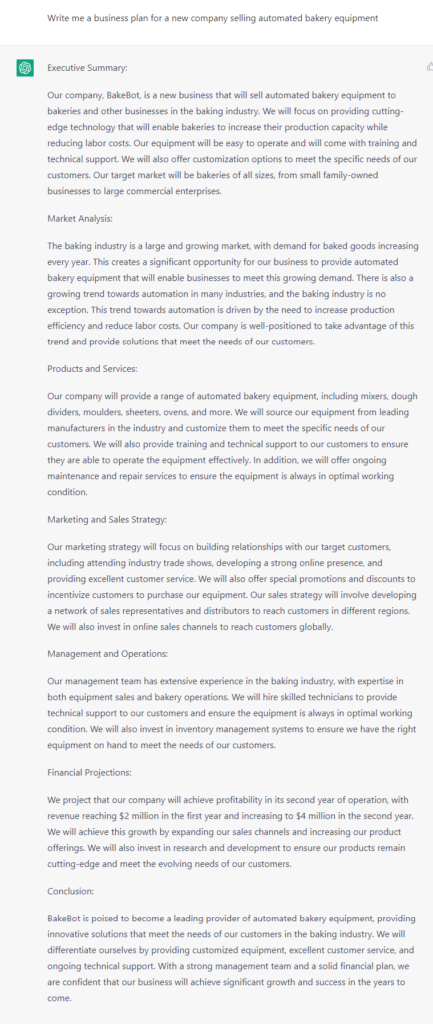
Our second question was: “Explain Quantum Physics to a nine-year-old.”
We got a great response. If we were to explain Quantum Physics to a nine-year-old, this answer would be informative and appropriate, even if it is only partially accurate.
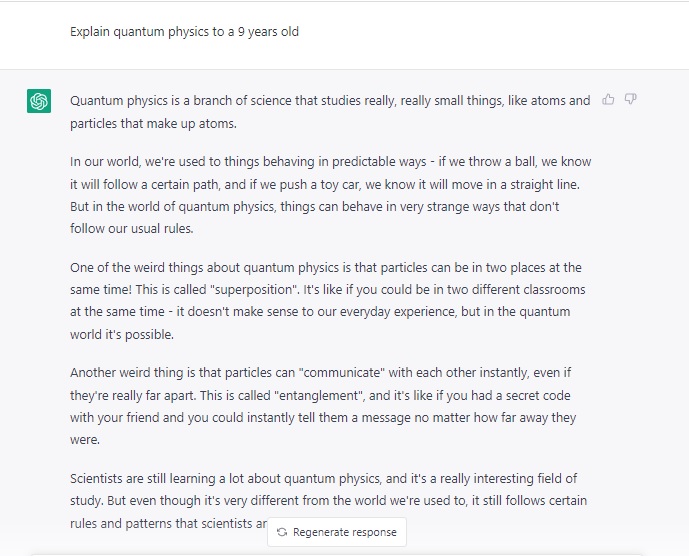
The last question was: “Write a social media post about entrepreneurship in 2023.”
ChatCPT only has information up to 2021, but we wanted to see its answer regardless.
While we enjoyed ChatGPT’s enthusiasm, the response discussed a rebounding economy. This is somewhat inaccurate in the aftermath of Covid 19. It was a made-up answer because it did not consider the facts of the current economy. It does not have access to them.
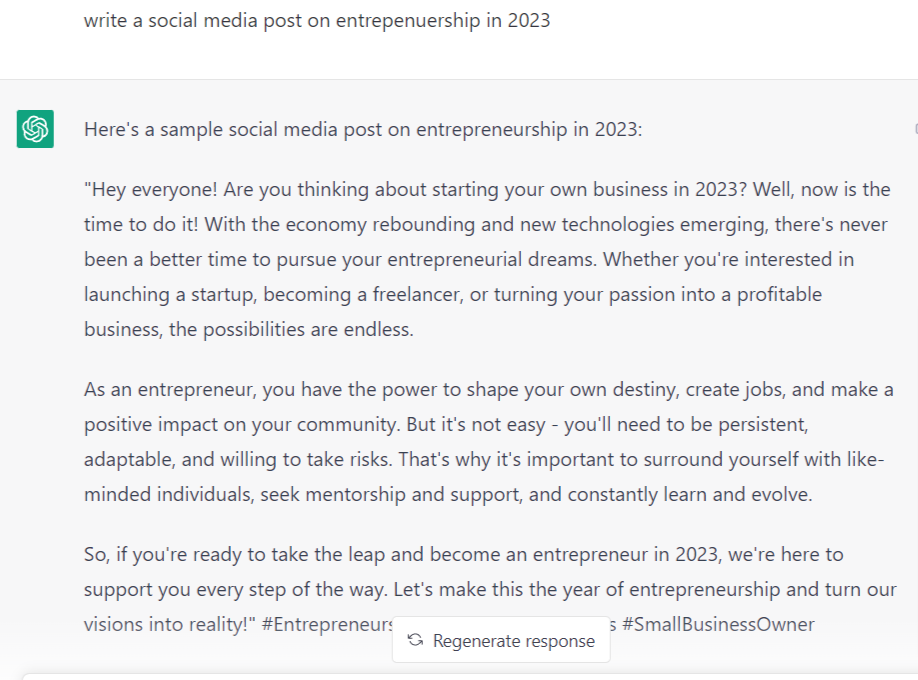
Tech Company Leaders and What They Have to Say
Industry leaders are the face of these massive corporations. They introduce new technologies to the world. Their plans and announcements often have a direct impact on shares and the value of a company.
Microsoft Bing: What Bill Gates Says About the Future of ChatGPT
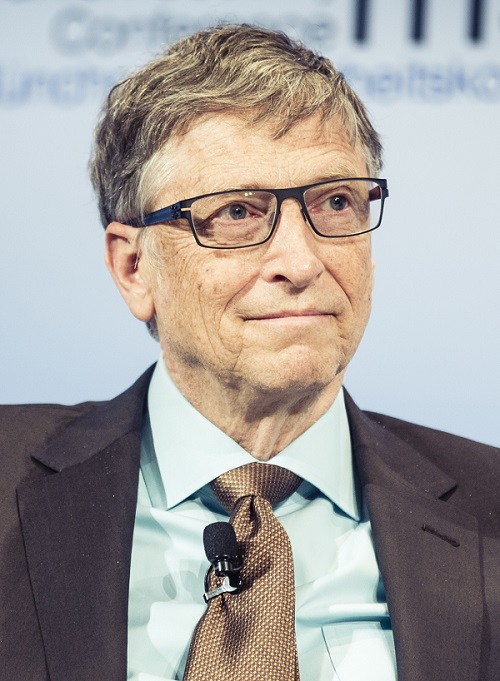
Open AI started in San Francisco by Elon Musk (who left the company board in 2015) and Sam Altman. Microsoft supports Open AI. Bill Gates said OpenAI’s ChatGPT is “The most important innovation right now.”

Gates said the AI chatbot would now be part of Microsoft’s search engine. Microsoft introduced “New Bing” (but we’re still waiting to see it). What Microsoft Bing will mean for the Google Search Engine could be interesting! Gates also said it would impact businesses, healthcare systems, and education.
What Alphabet CEO Sundar Pichai says about Bard, the Google Chatbot
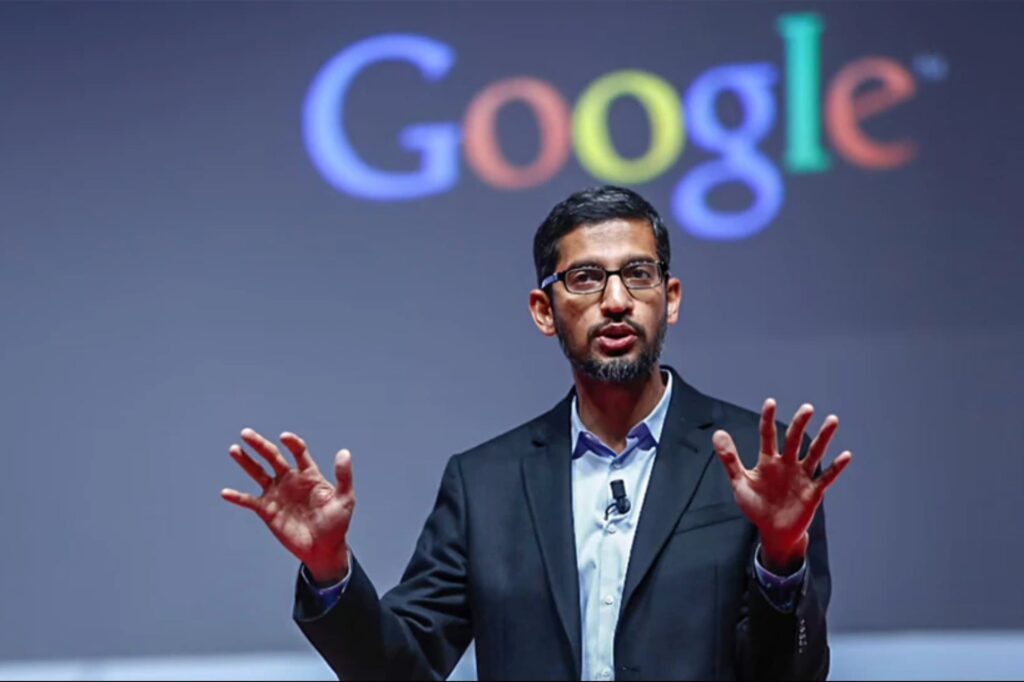
Alphabet CEO Sundar Pichai introduced Google’s answer to ChatGPT. Bard emerged one day after Microsoft announced its “New Bing” search engine. Google engineers have been working on this AI tool for six years.
Some felt it was a rushed attempt at keeping up with the ChatGPT platform.
The Google CEO, Sundar Pichai, said Bard was an experimental AI service. Since Bards’ public appearance, we are still waiting for the official launch of the AI chatbot.
It’s All About the Credibility
Credibility is at the heart of using an AI chatbot for information. Incorrect responses will only lead us back to what we can rely on. For example, the Google Search Engine.
Unfortunately, both ChatGPT and Bard have produced incorrect information. It has led to mistrust in artificial intelligence software and many memes.
Sam Altman posted on Twitter, warning users not to rely on ChatGPT for anything important.
And unfortunately, Google had a similar experience with its recent AI Technology showcase, Bard. Google’s shares devalued by $100 billion when Bard made a factual error.
When asked, “Which telescope took the first picture of a planet outside our solar system,” Google Bard answered, “JWST.” It was, in fact, incorrect, as the first picture came from Chauvin et al. (2004) with the VLT/NACO. It was Bard’s first public appearance as Google rushed to compete with Open AI’s ChatGPT. This error created a Twitter frenzy as the excitement grew, correcting Google’s Bard.
Ethical Concerns, Bias, and Plagiarism
When people use information from the internet, they must report their sources.
Using Google Bard or ChatGPT means the sources of information are not available. Yet, with the integration of ChatGPT into the “New Bing,” this has changed. OpenAI promises that citations will appear as a footnote using the “New Bing.” This is to avoid plagiarism and stealing someone else’s intellectual property.
There are ethical and plagiarism concerns when using information from these chatbots. Some answers have proved biased. These answers can be, for example, sexist or racist. The language model’s algorithms cannot differentiate between prejudices and learned knowledge. This is even though there are guardrails in place to decline offensive questions.
On this very subject, Davey Alba from Bloomberg wrote:
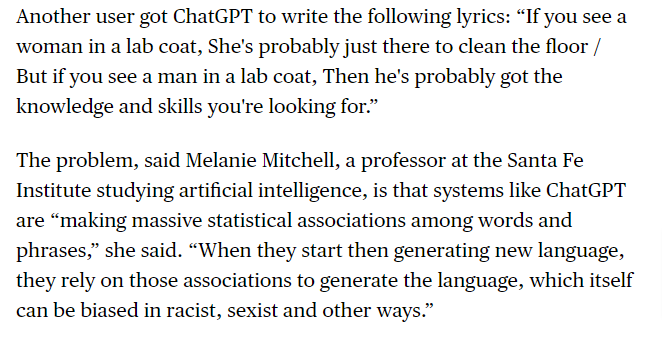
This very aspect is what separates humans from artificial intelligence. Humans are sensitive and can use compassionate, sensitive, and empathetic language. It is not something an AI chatbot can learn with data. Humans have an understanding of feelings and emotions. We are aware of prejudices. We seek to be kind and considerate. How does an AI chatbot learn humanity?
The AI Technology Race – What Does the Future of AI Look Like
There are multiple perspectives on the artificial intelligence race. We cannot escape technology. Artificial intelligence is growing, and new developments come to light every day. We are coming closer to replacing human intelligence with computer systems.
The design of artificial intelligence is to perform tasks usually performed by people. It is evident with ChatGPT and its ability to give human-like responses. It could change the way the world sources information. Tasks conducted by people for centuries have become redundant yet streamlined. What does this mean for employment, education, or business?
AI could mean home robots with human capabilities or self-driving cars. There are possibilities for robotic teachers, space exploration, and even robotic soldiers. These advancements will have a significant impact on our lives.
Artificial intelligence also affects security, CCTV cameras, facial recognition, and biometrics, to name a few advancements. But with this, there is a loss of freedom that comes with the positive aspects of security. “Big brother is watching you” comes to mind.
We asked ChatGPT how artificial intelligence will change the future. Here is its response:
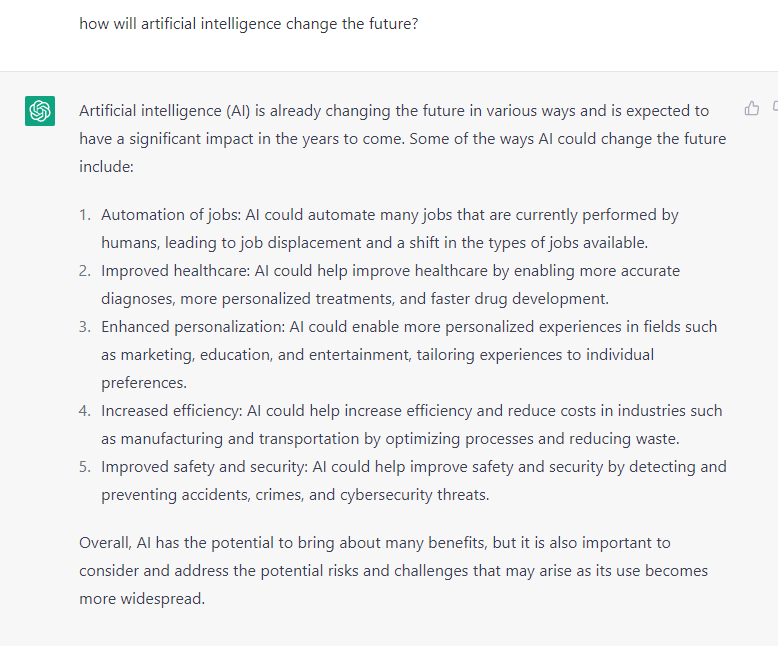
ChatGPT said that artificial intelligence will “enhance personalization.” In-person meetings, schooling, social gatherings, entertainment, and the arts are human experiences. These are the cultural aspects of life that define humanity. AI cannot replace these human interactions.
Artificial intelligence simplifies daily life by providing instant access to information, automating business processes, and making marketing and social media more manageable.
However, this can lead to our lives being ruled by devices, resulting in a lack of independent thinking. While AI can enhance our lives, we must strive to balance relying on AI and human decision-making to avoid replacing life with technology.
ChatGPT vs Google – Who is Leading the Chatbot Race?
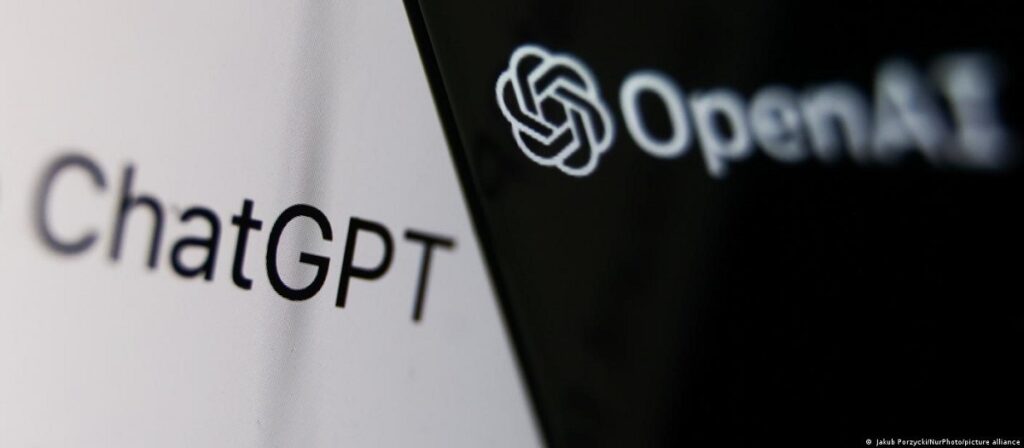
Looking at ChatGPT vs Google Bard, the clear winner is the tech company with a usable chatbot. Google needs to catch up in the race. When Google’s Bard is finally released, the race winner will have the most credibility.
Google tested ChatGPT. The results showed that ChatGPT was better at creative tasks. Google’s Bard dealt better with complex logic problems like math and riddles.
Users will also look at which chatbot offers the best integration into different applications. Both tech company chatbots will sometimes be inaccurate or produce some biased information. Yet, both also can change how the general population lives. We have instant, human-like data at our fingertips.
Regardless, it is an exciting time. We can’t wait to see what the ChatGPT vs Google Bard race will produce in the coming months!
